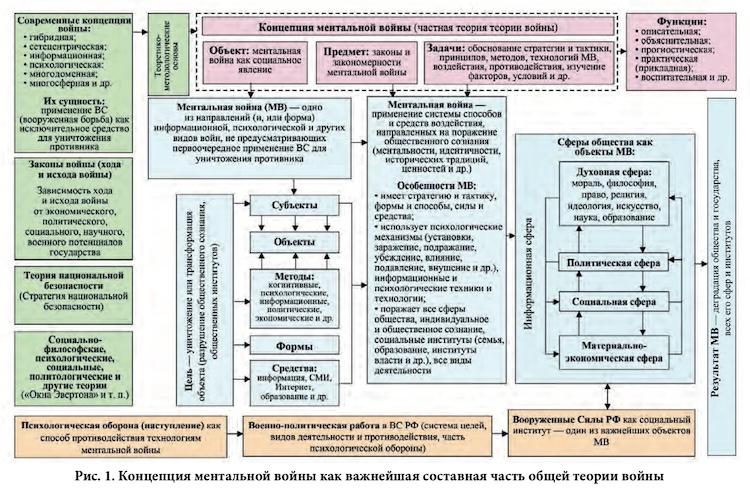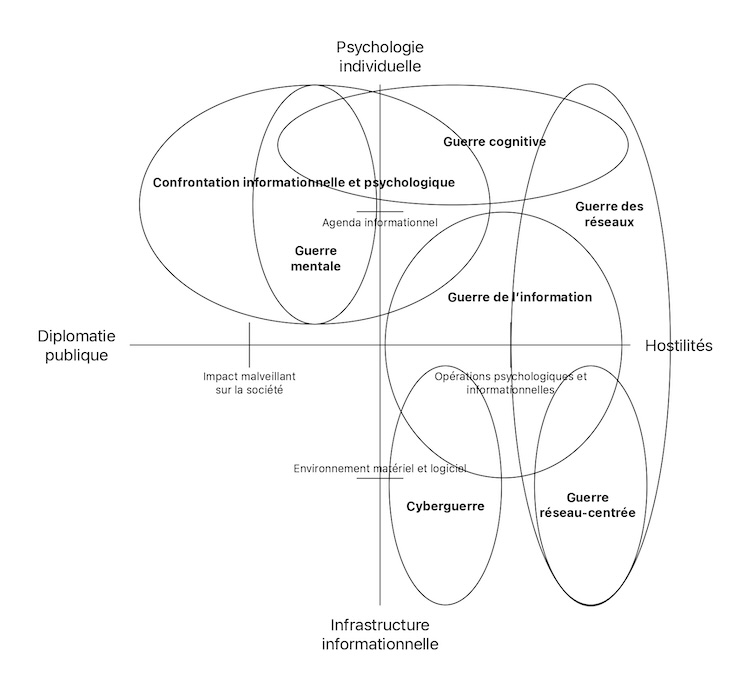Mental Warfare - Russian-style Cognitive Warfare
Denys Kolesnyk / 2023-10-05
This article was originally published on January 27, 2023, on Info Ops France.
In March 2021, Andrei Ilnitski, advisor to the Russian Defense Minister, declared that “the West, led by the United States, has unleashed a Mental Warfare against Russia, the consequences of which will manifest themselves at least a generation later”.
In August of the same year, he published an article entitled “Russia’s Mental Warfare” in the military-theoretical magazine Voyennaya Mysl1 (from Russian - military thought).
Since then, we’ve seen the emergence of scientific works and debate in the Russian-speaking part of the world on this subject. It seems, however, that the Russians have been inspired by articles published by Westerners on “Cognitive Warfare”.
Russian Mental Warfare
Ilnitski argues in his article that it’s hard to overestimate the “role of the Russian army in the civilizational context and [in] the formation of the [Russian] state”. Consequently, the Russian armed forces “are not only a guarantor of security but also the basic institution of the state, the source of the ideology of service to the Fatherland”. Russia, in turn, is seen as a “civilization” apart, which the West, led by the USA, wants to destroy.
In his view, introducing new definitions of warfare into professional discourse “is not just a question of the terminology”. He therefore proposes a definition of Mental Warfare in his article2 published in 2022:
“Mental Warfare is a coordinated set of actions and operations on several scales designed to ‘occupy’ the enemy’s mind to paralyze his will, to alter the individual and mass consciousness of the population to demoralize the army and society, to destroy the spiritual and moral values, traditions and cultural and historical foundations of the state, to ‘erase’ the national identity of the people.”
Ilnitski refers to the objective of this “new type of warfare” as the destruction of consciousness, changing the mental, and civilizational basis of the enemy’s society. However, he maintains that “contrary to cyber warfare and direct information operations, mental warfare is directed and implemented in the context of an emerging de facto ‘post-truth world’, in which people are weaned from critical thinking, from the desire to know the truth”.
He also outlines the aims, stages, and technologies of Mental Warfare (see table below).
| Indicators | Substance and content |
|---|---|
| Strategic aims | Rebooting of historical self-consciousness, education and upbringing system, and thus the basic meanings and goals of society, i.e. ideology, including rewriting (zeroing) of history, destruction of traditions, ways of life, faith (religion) and basic values. Realized on a generational scale (10-15 years) |
| Operational aims | Attack on the established way of life, dismantling, vulgarization and displacement of actual norms of behavior, undermining trust in the authorities, splitting society. Realized within 3-5 years |
| Steps | First step - informational and ideological influence; Second step - social technologies of manipulating society |
| Implementation technology | It includes informational and psycho-emotional components. AI technologies are actively used in both of them |
In general, in the two articles published by Andrei Ilnitski, we observe the dominance of propaganda elements focusing on the importance of the army, the regime, and Russian “traditional values”, echoing the National Security Strategy, published in 2021, where “Westernization” is seen as a threat to the Russian state.
The concept of Mental Warfare as a doctrinal element
Another article of interest was also published in Voyennaya Mysl by retired Colonel, Doctor of Military Sciences, I. Karavayev, entitled “The Concept of Mental Warfare as an Element of War and Army Doctrine"3.
The author also offers his definition of Mental Warfare as follows:
“Mental Warfare is understood as the use by an adversary of a system of methods and means of influence aimed at striking at the public consciousness (mentality, identity, historical traditions, values, etc.) of the opposing party, both in peacetime and during military conflict. It aims to destroy or transform the object of influence: the destruction of public consciousness, social institutions, the state, armed forces, etc.”
Karavayev also proposes the scheme of Mental Warfare as a main part of the general theory of warfare (see diagram below). According to the proposed scheme, the aim of Mental Warfare is the “destruction or transformation of the object (the destruction of public consciousness and public institutions)”, resulting in the result “the degradation of society and the state, of all its spheres and institutions”.

Colonel Karavayev maintains that the main forms of Mental Warfare include multi-step informational operations that use specific psychological mechanisms to influence human consciousness (attitudes, contagion, imitation, persuasion, influence, suppression, suggestion, etc.), special forces and means, network technologies and techniques and other psychological techniques that affect the mentality of society as a whole, all its spheres, individual and public consciousness, social relations, social institutions, including families, education, authorities, all types of activity.
He distinguishes the main rules of Mental Warfare:
- Increasing intensity;
- The exhaustiveness and increasing assertiveness of the impact on all spheres of society (like a “cancerous tumor”);
- The interconnection and mutual influence of all spheres of society and social institutions in Mental Warfare;
- The decisive character of the spiritual sphere and the significant influence of economic factors on the transformation of society;
- Delayed impact due to inertia of consciousness (complexity of counter-action to Mental Warfare technologies, as it is difficult and sometimes impossible to succeed in rejecting false beliefs and illusions imposed by the enemy), resulting in problems in the “healing” of consciousness and transformations in the spiritual sphere of society, which have become a consequence of the application of Mental Warfare technologies.
Karavayev’s article attempts to lay the theoretical foundations for this new Russian concept of Mental Warfare.
Mental Warfare equals Cognitive Warfare?
Two other authors from St. Petersburg State University, Roman Vykhodets and Konstantin Pantserev, propose in their article “Comparative analysis of modern concepts of information warfare"4 an analysis of concepts existing in scientific discourse, describing the spheres of information confrontation (cf. diagram below).

The authors maintain that in English-language sources, Mental Warfare is referred to as Cognitive Warfare. In their view, the formation of the concept of Cognitive Warfare is linked to NATO’s search for new forms of warfare. They cite the article “The Cognitive Warfare Concept” by Bernard Claverie and François du Cluzel. Understanding the phenomenon of Cognitive Warfare rests on the recognition of psychology and the human mind as a sixth domain of warfare, along with air, land, sea, space, and cyber.
It’s worth giving the definition5 of Cognitive Warfare, as proposed by Claverie and du Cluzel - the authors cited by the Russians:
“Cognitive Warfare is a form of an unconventional form of warfare that uses cyber tools to alter enemy cognitive processes, exploit mental biases or reflexive thinking, and provoke thought distortions, influence decision making and hinder action, with negative effects, both at the individual and collective levels.”
The Russian authors equate Cognitive Warfare with the concept of Mental Warfare, developed in Russia. However, in the proposed diagram, the two terms occupy different places, with Mental Warfare situated between public diplomacy and individual psychology, while Cognitive Warfare is positioned between public diplomacy and hostilities, affecting individual psychology. This constitutes a contradiction within the same scientific article, which in itself may indicate the existence of uncertainty within the Russian scientific community regarding the recently introduced concept of Mental Warfare.
At this stage, the emergence of the term Mental Warfare in Russian sources constitutes an attempt to introduce a new term that should respond to the same attempt on the part of Westerners to introduce the term Cognitive Warfare. However, despite the embryonic stage of development of Mental Warfare theory in Russian sources, this process is worth following.
-
А.М. Ильницкий, “Ментальная война России» опубликована в журнале”, Военная мысль №8, 2021 ↩︎
-
А.М. Ильницкий, “Стратегия ментальной безопасности России”, Военная мысль №4, 2022 ↩︎
-
И.Н. Караваев, “Концепция ментальной войны как составная часть учения о войне и армии”, Военная мысль №3, 2022 ↩︎
-
Р.С. Выходец, К.А. Панцерев, “Сравнительный анализ современных концепций информационного противоборства”, Евразийская интеграция: экономика, право, политика, №4, 2022 ↩︎
-
Claverie, B., & du Cluzel, F. (2022). The Cognitive Warfare Concept. Innovation Hub Sponsored by NATO Allied Command Transformation, 2022-02 ↩︎